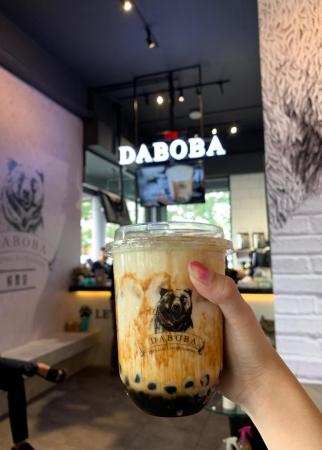Bubble Milk Tea, Best-Loved by the Chinese? | By Jane Law
It is official! The bubble tea craze has taken Malaysia by storm. What was thought to be a fad has mushroomed all around Klang Valley and flocked the media. Oftentimes, we could see hordes of people queuing up for hours and hours under the scorching hot sun just to get their hands on that icy, sinful slurps of sweetness. If straightened, the winding line in front of the stores would have stretched for more than a kilometer! However, if you take a closer look, have you noticed that most of the people in line are Chinese?
 |
| Illustration by Zoe @203.yuyu |
 |
| Xing Fu Tang Photography by Tan Li Hwa |
“I love it!” exclaimed a Chinese patron that was waiting in line at the store to get her bubble tea fix.
“I have it almost every day! I know it is unhealthy, but I just cannot stop! It’s addictive and so delicious,” she continued.
 |
| Daboba, one of the many bubble tea shops. |
The first one being, it hits too close to home. Bubble tea is an ‘all-too-familiar’ dessert for them. Bouncy, chewy solid spheres bobbing in milky, sweet soups have been a dessert trademark throughout Asia for hundreds of years, especially for the Chinese. Tang Yuan (glutinous rice balls floating in sugar-infested soup-based), Tong Shuis like Sai Mai Lo (a sweet coconut and milk-based soup with sago, which resembles a smaller-sized version of tapioca pearls), and Grass Jelly (a black jelly-like dessert that is often mixed with cold soy milk or evaporated milk) which has also become a staple for bubble tea toppings. Notice the similarities? Bubble tea is not far from this particular theme! Soft chewy items in saccharinely sweet liquids are generally much loved among the Chinese and fit well with almost any of their palates. Naturally, bubble tea would just be another way to satisfy the Chinese sweet tooth.
 |
| Tealive, a common store to find bubble tea. Photograph by Tan Li Hwa |
“Chinese now consume five times more milk tea than coffee,” said Bryan Loo, the chief executive officer of Loob Holdings which is a Malaysian homegrown food and beverage company.
“Bubble tea consumption in particular, continues to rise at a high rate each year,” according to MarketingToChina in 2018.
A quantitative survey on studying the reasons why the Chinese enjoy bubble tea so much was carried out among a group of self-proclaimed Chinese bubble tea enthusiasts. The majority chose that they relish the taste of tea, the texture of the pearls, the fragrance of the tea and that it was a great snack after a meal.
Others also mentioned that they are fond of the sweetness of the drink or that they take it due to the ongoing hype and trend. When asked if they preferred coffee or tea, 52.6% of the respondents picked tea. Their reasons being tea is a less concentrated beverage and that they cannot stand caffeine on a regular basis. Based on the responses, 57.9% of the replies showed that Chinese generally favour tea more than coffee and 68.4% of them agree that it has to do with the Chinese tea drinking culture.
Tea has long been a significant part of Chinese culture for decades and is considered a staple beverage, a curative, and a status symbol for many. Described as “a pillar” in life, tea has accompanied the Chinese people since more than five thousand years. It has been used in ceremonies, traditions and customs. Therefore, it is common to see the Chinese enjoying a cup of hot tea before and after a meal just as it is to see them flock to buy the modern variant of bubble tea.
There is no conclusive reason why the Chinese race adore this so-called ‘sweet but deadly brew’ so much. Some mentioned it was due to the price being slightly cheaper compared to Starbucks, others debated that the popular flavoured tea was a combination of a drink and a snack, which may appeal to them after their meals. Until then, the bubble tea boom is showing no signs of bursting anytime soon.






0 comments